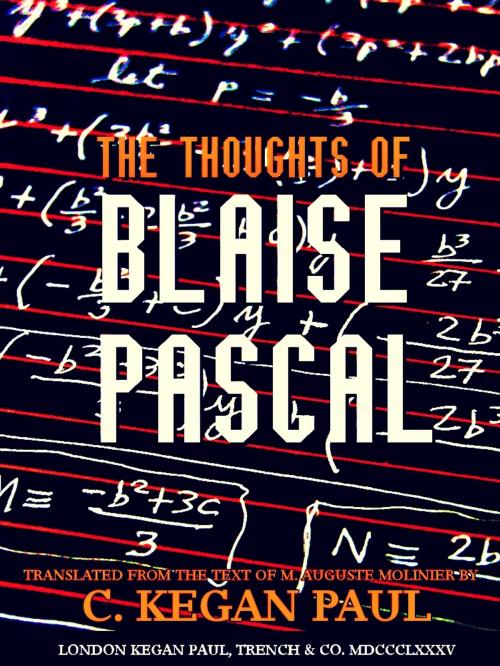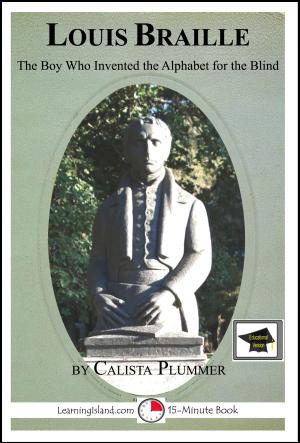The Thoughts of Blaise Pascal
Biography & Memoir, Artists, Architects & Photographers, Nonfiction, Art & Architecture, Historical| Author: | Blaise Pascal, M. Auguste Molinier, C. Kegan Paul | ISBN: | 1230000269799 |
| Publisher: | LONDON KEGAN PAUL, TRENCH & CO. | Publication: | September 22, 2014 |
| Imprint: | Language: | English |
| Author: | Blaise Pascal, M. Auguste Molinier, C. Kegan Paul |
| ISBN: | 1230000269799 |
| Publisher: | LONDON KEGAN PAUL, TRENCH & CO. |
| Publication: | September 22, 2014 |
| Imprint: | |
| Language: | English |
.Example in this ebook
Those to whom the Life of Pascal and the Story of Port Royal are unknown, must be referred to works treating fully of the subject, since it were impossible to deal with them adequately within the limits of a preface. Sainte-Beuve's great work on Port Royal, especially the second and third volumes, and "Port Royal," by Charles Beard, B.A., London, 1863, may best be consulted by any who require full, lucid, and singularly impartial information.
But for such as, already acquainted with the time and the man, need a recapitulation of the more important facts, or for those who may find an outline map useful of the country they are to study in detail, a few words are here given.
Blaise Pascal was born at Clermont-Ferrand in Auvergne, on June 19, 1623. He sprung from a well-known legal family, many members of which had held lucrative and responsible positions. His father, Etienne Pascal, held the post of intendant, or provincial administrator, in Normandy, where, and at Paris previously, Pascal lived from the age of sixteen to that of twenty-five; almost wholly educated by his father on account of his precarious health. His mother died when he was eight years old. Etienne Pascal was a pious but stern person, and by no means disposed to entertain or allow any undue exaltation in religion, refusing as long as he lived to allow his daughter Jaqueline to take the veil. But he had the usual faiths and superstitions of his time, and believing that his son's ill-health arose from witchcraft, employed the old woman who was supposed to have caused the malady to remove it, by herbs culled before sunrise, and the expiatory death of a cat. This made a great impression on his son, who in the "Thoughts" employs an ingenious argument to prove that wonders wrought by the invocation of the devil are not, in the proper sense of the term, miracles. At any rate the counter-charm was incomplete, as the child's feeble health remained feeble to the end.
Intellectually, Blaise Pascal grew rapidly to the stature and strength of a giant; his genius showing itself mainly in the direction of mathematics; at the age of fifteen his studies on conic sections were thought worthy to be read before the most scientific men of Paris, and in after years of agonizing pain mathematical research alone was able to calm him, and distract his mind from himself. His actual reading was at all times narrow, and his scholarship was not profound. In 1646, his father, having broken his thigh at Rouen, came under the influence of two members of the Jansenist school of thought at that place, who attended him in his illness, and from that time dated the more serious religious views of the family. Jaqueline was from the first deeply affected by the more rigorous opinions with which she came in contact. Forbidden to enter the cloister, she lived at home as austere a life as though she had been professed, but after her father's death won her brother's reluctant consent to take the veil at Port Royal, and became one of the strictest nuns of that rigid rule.
To be continue in this ebook................................................................................................................
.Example in this ebook
Those to whom the Life of Pascal and the Story of Port Royal are unknown, must be referred to works treating fully of the subject, since it were impossible to deal with them adequately within the limits of a preface. Sainte-Beuve's great work on Port Royal, especially the second and third volumes, and "Port Royal," by Charles Beard, B.A., London, 1863, may best be consulted by any who require full, lucid, and singularly impartial information.
But for such as, already acquainted with the time and the man, need a recapitulation of the more important facts, or for those who may find an outline map useful of the country they are to study in detail, a few words are here given.
Blaise Pascal was born at Clermont-Ferrand in Auvergne, on June 19, 1623. He sprung from a well-known legal family, many members of which had held lucrative and responsible positions. His father, Etienne Pascal, held the post of intendant, or provincial administrator, in Normandy, where, and at Paris previously, Pascal lived from the age of sixteen to that of twenty-five; almost wholly educated by his father on account of his precarious health. His mother died when he was eight years old. Etienne Pascal was a pious but stern person, and by no means disposed to entertain or allow any undue exaltation in religion, refusing as long as he lived to allow his daughter Jaqueline to take the veil. But he had the usual faiths and superstitions of his time, and believing that his son's ill-health arose from witchcraft, employed the old woman who was supposed to have caused the malady to remove it, by herbs culled before sunrise, and the expiatory death of a cat. This made a great impression on his son, who in the "Thoughts" employs an ingenious argument to prove that wonders wrought by the invocation of the devil are not, in the proper sense of the term, miracles. At any rate the counter-charm was incomplete, as the child's feeble health remained feeble to the end.
Intellectually, Blaise Pascal grew rapidly to the stature and strength of a giant; his genius showing itself mainly in the direction of mathematics; at the age of fifteen his studies on conic sections were thought worthy to be read before the most scientific men of Paris, and in after years of agonizing pain mathematical research alone was able to calm him, and distract his mind from himself. His actual reading was at all times narrow, and his scholarship was not profound. In 1646, his father, having broken his thigh at Rouen, came under the influence of two members of the Jansenist school of thought at that place, who attended him in his illness, and from that time dated the more serious religious views of the family. Jaqueline was from the first deeply affected by the more rigorous opinions with which she came in contact. Forbidden to enter the cloister, she lived at home as austere a life as though she had been professed, but after her father's death won her brother's reluctant consent to take the veil at Port Royal, and became one of the strictest nuns of that rigid rule.
To be continue in this ebook................................................................................................................















